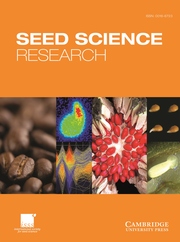Article contents
Changes in ribosomal RNA integrity in leek (Allium porrum L.) seeds during osmopriming and drying-back treatments
Published online by Cambridge University Press: 19 September 2008
Abstract
Loss of vigour in leek (Allium porrum L.) seed lots is accompanied by the appearance of damage to ribosomal RNA in quiescent embryo tissue. Polyethylene glycol osmopriming treatments of such low-vigour seed permit replacement of this damaged ribosomal rRNA over a 7-day priming period. Low-vigour leek seeds germinated for 6 days without a prior osmopriming treatment still exhibit evidence of damaged ribosomal RNA in embryo tissue. Osmoprimed leek seeds dried back whilst still in the desiccation-tolerant state retain most of the benefits conferred by priming treatments. Osmoprimed leek seeds dried back when having reached the desiccation-sensitive state germinate poorly, if at all, and exhibit much reduced rates of protein synthesis in embryo tissue upon rehydration compared to desiccation-tolerant seeds. Embryo tissue from dried back, desiccation-tolerant seeds exhibits the capacity for much higher levels of protein synthesis than embryo tissue from unprimed seeds at equivalent stages of imbibition. RNA levels continue to increase in embryo tissue upon rehydration of dried back, desiccation-tolerant leek seeds but not in desiccation-sensitive seeds. Loss of protein synthetic capacity in desiccation-sensitive seeds during rehydration is accompanied by increasing levels of ribosomal RNA degradation. Such ribosomal RNA degradation may be indicative of the germinative capacity of leek seeds dried back after osmopriming treatments.
Information
- Type
- Research Papers
- Information
- Copyright
- Copyright © Cambridge University Press 1991
Footnotes
Department of Genetics, University of Cambridge, Downing Street, Cambridge CB2 3EH, UK
References
- 5
- Cited by

